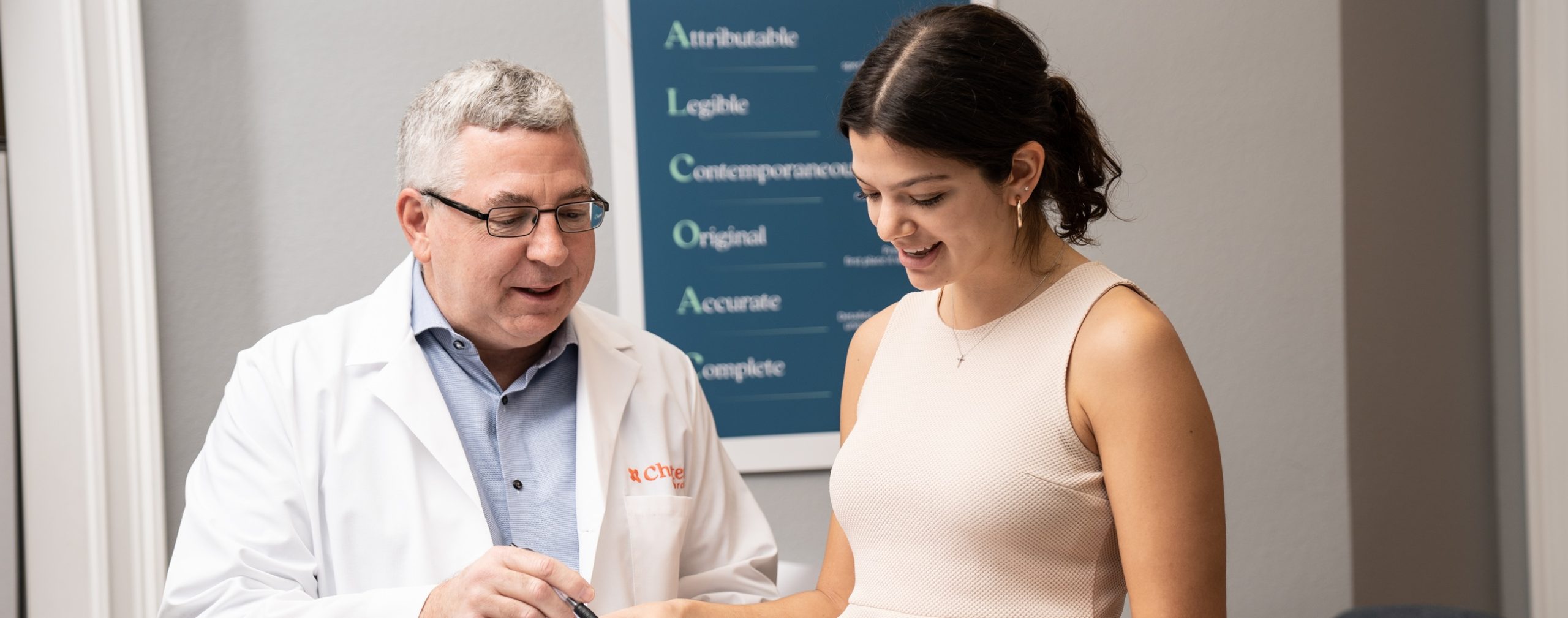Get To Know: Dr. Jeffrey Norton, Medical Director, The Villages
If you’ve been to our research center in The Villages, you might recognize Dr. Jeffrey Norton, our Medical Director there. You might’ve also seen him at one of our community events. Today we’re pulling back the curtain to give you a closer look at the man behind the research—his story, his passion, and why he chose to devote his career to improving lives through clinical trials.
Dr. Norton leads our research efforts in The Villages, and if you’ve ever considered participating in one of our studies, you’re in excellent hands. With more than 40 clinical trials under his belt, Dr. Norton is committed to helping patients just like you access potential groundbreaking treatments for a range of conditions from Alzheimer’s disease to Parkinson’s disease to obesity.
An Introduction to Clinical Research
His path in healthcare began at Hahnemann University School of Medicine in Pennsylvania. After graduating, he completed both his residency in anesthesiology and his fellowship in pain management at Massachusetts General Hospital in Boston. It was there that Dr. Norton first learned about the world of clinical research.
“Even back when I was a resident and a fellow, there was research being done all over the place. I was exposed to research from the very beginning,” he said.
Dr. Norton went on to spend the next 20 years serving patients in clinical practice as an anesthesiologist and pain management specialist. During this time, he also taught students about anesthesia at Harvard Medical School. Working in private practice was fulfilling, but something was drawing him to clinical research.
“I always wanted to do more research, but it was difficult to do it at the same time as having a clinical practice,” Dr. Norton said. It was time for a shift.
Joining Charter Research
A friend of Dr. Norton was familiar with Charter Research and encouraged him to look into the work we do. It didn’t take long before Dr. Norton was thoroughly impressed by the dedication of our founders, Jessica Sletten and Jeff Pohlig.
“They really seemed very passionate about what they were doing,” Dr. Norton said. “I liked their people-centered approach to research.”
The decision was easy. Since joining Charter Research five years ago, work looks a lot different for Dr. Norton. He has embraced the increased attention that he is now able to give to patients through clinical trials. “In clinical practice, you don’t feel like you’re giving patients the time they need,” Dr. Norton said. “In research, we have a lot more time to talk to patients and answer their questions.”
The Charter Research team believes that clinical trials should be just as much—if not more—about the patient as they are about the science.
“Every single patient that participates in a research trial is a volunteer. You deserve extra special attention and an experience that’s better than average,” Dr. Norton said.
He appreciates the commitment to care that radiates throughout every decision, detail, and interaction with the patient volunteers. “I really value our emphasis on teaching and training our employees the proper way to conduct a research trial, treat patients well, and generate good, useful data,” Dr. Norton said.
These approaches are great for you—as our patient volunteers—and for the company, too. As a team, we’ve grown rapidly into new areas of research such as neurodegenerative disorders, biomarker studies, and metabolic diseases.
Dr. Norton is energized about what this means for you, our community, and the future of medicine. “I’m excited about the growth and the opportunity to take on new challenges,” Dr. Norton said. “We’ve grown our team from 10 people in 2020 to almost 150 people in 2024. We have lots of plans for the future.”
Alzheimer’s & Neurodegenerative Research
A big area of focus for Dr. Norton are neurodegenerative disorders such as Alzheimer’s disease. “During clinical trials you can actually see the disease process slow down or some aspect of a patient’s quality of life improves. That’s been very gratifying,” Dr. Norton said.
He is optimistic, but acknowledges that there’s still much more work to be done. “We need to look at other treatments that could slow the disease further, or ideally, stop it or cure it,” Dr. Norton said.
At the end of October, he is going to the international Clinical Trials on Alzheimer’s Disease (CTAD) conference in Spain, where attendees will share results and breakthroughs in Alzheimer’s disease. He will be showcasing several of his own research posters at the event. “I really love being able to collaborate with people from literally around the world. We’re all working toward the same thing,” Dr. Norton said.
While some people might fear clinical research because they associate it with the word “experimental,” Dr. Norton emphasizes that clinical research is highly controlled and closely monitored for safety. “The safety nets in research are of the highest level compared to anything in clinical practice,” he said. By volunteering for a research study, you can make a difference — not only in your own life but in the lives of millions of others around the globe.
“Research isn’t scary. Participating in a research study is a way that you can give back to the world and in some instances, get potentially helpful treatments,” Dr. Norton said.
